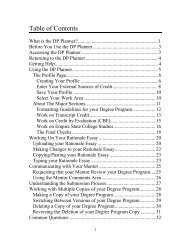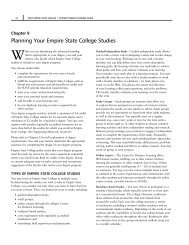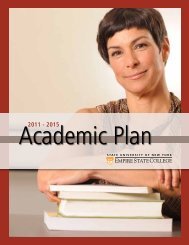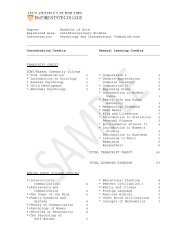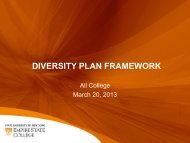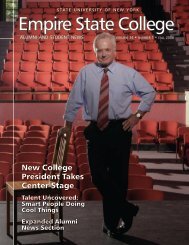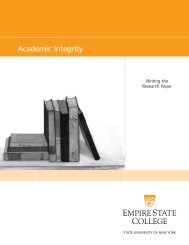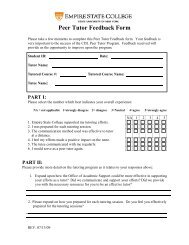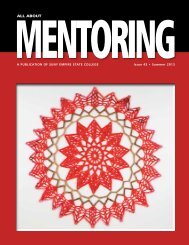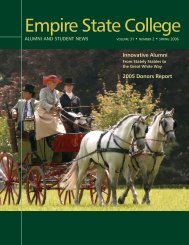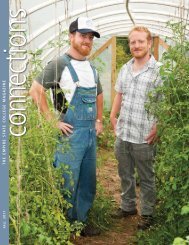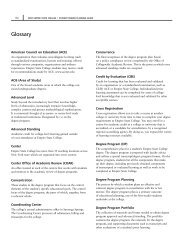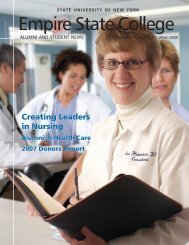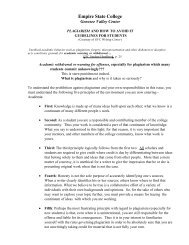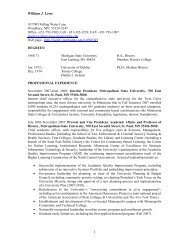All About Mentoring Spring 2011 - SUNY Empire State College
All About Mentoring Spring 2011 - SUNY Empire State College
All About Mentoring Spring 2011 - SUNY Empire State College
Create successful ePaper yourself
Turn your PDF publications into a flip-book with our unique Google optimized e-Paper software.
58<br />
I kept at it, and also continued many other<br />
pieces of volunteer work in my community<br />
in an effort to impart my academic and<br />
experiential knowledge. I wanted to<br />
work for good programming for youth<br />
and families at risk. I wanted to work<br />
toward ensuring some overall good in my<br />
community. And as I met many people in<br />
this work, one thing kept creeping up in<br />
my conscience: Those I was working with<br />
and for were very often endowed with<br />
Goleman’s competencies – and especially<br />
with empathy – as a typical hallmark.<br />
I kept thinking about Goleman and about<br />
his newer work on what he describes as “the<br />
emotionally intelligent workplace” (2001).<br />
Around me and inside me I was moving far<br />
from any “look at me”-narcissism about<br />
contribution, and instead beginning to<br />
attach personal and social competencies<br />
to a teaching model based on leading<br />
by example. I was exemplifying one of<br />
Goleman’s tenets: Emotional intelligence is<br />
not static. It can be cultivated, and I believe<br />
that in my cultivating, I was working to<br />
pick the fruits of this emotionally intelligent<br />
garden and feed them to specific and<br />
special young girls, entire not-for-profit<br />
youth serving organizations, and peace<br />
and diversity task forces among other<br />
community groups.<br />
I wanted to work for<br />
good programming for<br />
youth and families at<br />
risk. I wanted to work<br />
toward ensuring some<br />
overall good in my<br />
community.<br />
Already this has been a life’s work, and<br />
many of the young people I once impacted<br />
as mentor, homework assistant and agency<br />
expert volunteer now sit alongside me on<br />
the very boards of agencies where they<br />
participated, played, scraped knees, attended<br />
college trips, and sought help of all kinds.<br />
Without the blinding near-sightedness of<br />
early narcissism that can motivate some<br />
in volunteerism, I now fully see that when<br />
one works through the immediate perks of<br />
the notoriety of “expertise,” there are no<br />
replacements for the evolving competencies<br />
of self-awareness, self-regulation,<br />
motivation, social skills and empathy. There<br />
are no replacements for humanity linked<br />
with compassion. My former blind side is<br />
shined now to a 20/20 vision polish each<br />
time a child, a young adult or older adult<br />
recognizes me as “that lady who taught me<br />
to open a new door.”<br />
References<br />
Cherniss, C. and Goleman, D. (Eds.) (2001).<br />
The emotionally intelligent workplace.<br />
San Francisco, CA: Jossey-Bass.<br />
Goleman, D. (1995). Emotional intelligence:<br />
Why it can matter more than IQ. New<br />
York, NY: Bantam Dell.<br />
suny empire state college • all about mentoring • issue 39 • spring <strong>2011</strong>



